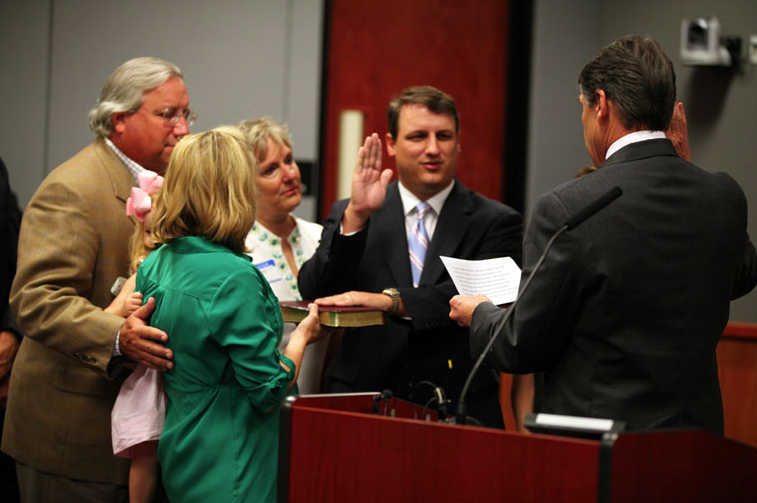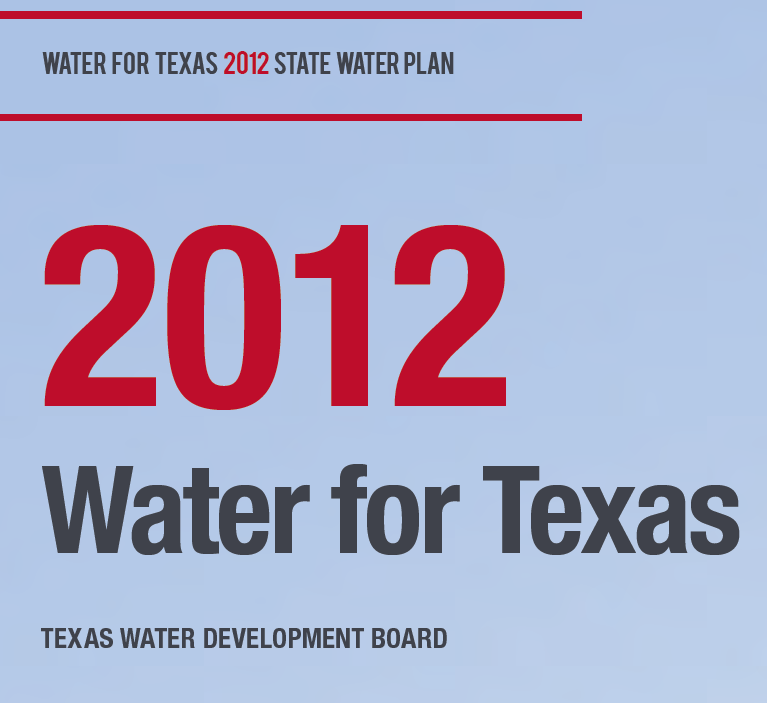Though being aggressively sold as the best way to secure adequate water supplies for Texas’ future, Prop 6, to be voted on in Texas on November 5, would fund a very specific vision that can only honestly be called a Big Business, Big Infrastructure response.
It is, above all else, an endorsement of the priorities as stated in the Texas Water Plan that will be directed by a recently restructured Texas Water Development Board now headed by salaried Perry appointees, including an owner of a natural gas company that earned Perry $25,000 last year.
But concerns over Prop 6 start with the state’s water plan itself – heavy on enormously costly water transfers from rural corners of the state to city centers, particularly North Texas.
Prop 6 was preceded by Prop 2 in 2011, a sales campaign that was heavily financed by the Texas Association of Realtors (up to $1.8 million may have been spent selling the plan, according to Ballotpedia). That constitutional amendment gave the TWDB the authority to issue $6 billion in bonds for water projects around the state.
It’s money that, strangely, has since sat untouched.
Merry Klonower, TWDB’s director of communications, told HOE the reason is the board has yet to use up the monies loosed 2011 is because they have not yet tapped funds provided by a similar amendment in 2001.
Consider Prop 2 a test run for a much more ambitious Prop 6, which funnels $2 billion of the state’s Rainy Day Fund into a newly created State Water Implementation Fund for Texas (SWIFT) thereby creating a vehicle for cities and towns across the state to tap into low-interest loans for approved water projects. According to Klonower, is the release of cash allows for more cost-effective loans. “Over the life of a loan, lower interest rates can save significant amounts of money, sometimes millions of dollars,” she said.
This time the sales job is being driven by industrial interests like Dow Chemical and Valero.
Following that, in order of projected “new” water, is: irrigation conservation (17 percent), new major reservoir (26 “major new reservoirs” are recommended, 17 percent), water reuse (10 percent), groundwater (9 percent), and municipal conservation (7 percent).
Reservoirs are a major component, despite the plan’s own acknowledgment that “surface water would be the most vulnerable to projected climatic changes through increased evaporation and decreased streamflows.”
According to the plan:
“Other surface water” strategies include existing supplies that are not physically or legally available at the present time. Examples include an existing reservoir that has no pipeline to convey water to some or all users, a water user that does not have a water supply contract with the appropriate water supplier, or an entity that has no “run-of-river” water right to divert water for use. …
Transporting water from existing, developed sources such as reservoirs, to a new point of use many miles away, is very common in Texas and will become more prevalent in the future.
What the plan downplays are the true potentials of tougher conservation strategies in urban areas, rainwater harvesting, desalination, and brush control (those junipers are water hogs).
Innovation, in other words, is not in the equation.
Writes PrivateWaterLaw Blog:
Importantly, SWIFT is prohibited from providing any financial assistance to a project that is not listed in the State Water Plan. … Unfortunately, it may disincentivize innovation by the private sector or local governmental officials for projects that are not part of the long-term planning efforts of the State Water Plan. It also means that local governments must obtain political support for their projects from other agencies in their planning region.
The plan’s policy recommendations start with reservoirs (with a nod to habitat conservation of streams considered to possess “unique ecological value” – though, the plan points out, it will be up to the Texas Legislature to make these designations official), followed by pipelines for “inter-basin transfers.”
If Prop 6 is approved, city projects seeking to tap into those funds must already be among the impressive 562 water-supply projects already in the State Water Plan. That’s why Prop 6 essentially is voting on implementation of the Texas Water Plan.
But back to that TWDB board.

HB 4 signed into law by Perry earlier this year is the legislation that not only provides the legal framework to make Prop 6 functional but abolished the previous TWDB board and replaced it with salaried Perry appointees. It is this new bunch, sworn in this September, that will decide how the multi billion-dollar water plan is carried out. (Though the plan reaches out into 2060 and calls for more than $50 billion, the largest chuck of cash averaged over that timeframe — $15.7 billion – is expected to be dished out between 2015 and 2019, during the terms of possibly two of the three TWDB members.)
From the Governor’s press release:
Carlos Rubinstein has been appointed to serve as chairman of the Board. He is currently a commissioner of the Texas Commission on Environmental Quality (TCEQ) and has held that appointment since August 2009. … His term will expire Feb. 1, 2017, and he will serve as chair of the board for a term to expire at the pleasure of the governor.
[Bech] Bruun is currently serving as Director of Governmental Appointments for the Office of the Governor, and previously served as the government and customer relations manager for the Brazos River Authority. … His term will expire Feb. 1, 2015.
Mary Ann Williamson is owner of MKS Natural Gas Company. She is a board member and current chair of the Texas Lottery Commission, a board member of the Texas Alliance of Energy Producers, and a member of the Texas Society of Certified Public Accountants. She is also a member of the Austin Colony Chapter of the Daughters of the American Revolution and past president of the Weatherford Independent School District Community Education Advisory Council. Williamson received a bachelor’s degree in accounting from the University of Texas at Austin and a master of business administration from Texas Christian University. Her term will expire Feb. 1, 2019.
If you’re interested in that MKS Williamson-Perry scandal, I can do no better than turn you over to The Daily Beast:
In Texas Gov. Rick Perry’s world, politics, and business seem to mix like natural gas and drilling rigs—literally.
Documents released in Texas this week show the 2012 GOP president candidate’s blind trust, which has managed his investments since he first ran for statewide office in the mid-1990s, owns a stake in MKS Natural Gas Company, a firm founded by Perry friends that controls about $3.4 million in gas rights in the heart of the shale field that has fueled Texas’s recent natural-gas boom.
The investment last year earned Perry less than $25,000 in income. The relationship, however, landed the company’s founder and his wife two premier jobs in state government during Perry’s tenure—just another example of a culture that Perry’s critics have derided as “crony capitalism.”
While the larger mainstream environmental groups have signed on to Prop 6, I find myself increasingly leaning to the fringe inhabited by a diverse pool of folks from a variety of political affiliations.
Austin-based Save Our Springs Alliance is among those urging a “no” vote. Today, I leave them the final word.
—
* I could not find evidence of this pipeline project in the Texas Water Plan and a spokesperson for the TWDB said they did not know what the author of the article in Southwest Farm Press (quoted in my last post on this subject) was referring to. The most expensive item listed in the Texas Water Plan I found was the proposed $3.3 billion Marvin Nichols Reservoir to feed DFW, 170 miles away, a project opposed by the Sierra Club.












